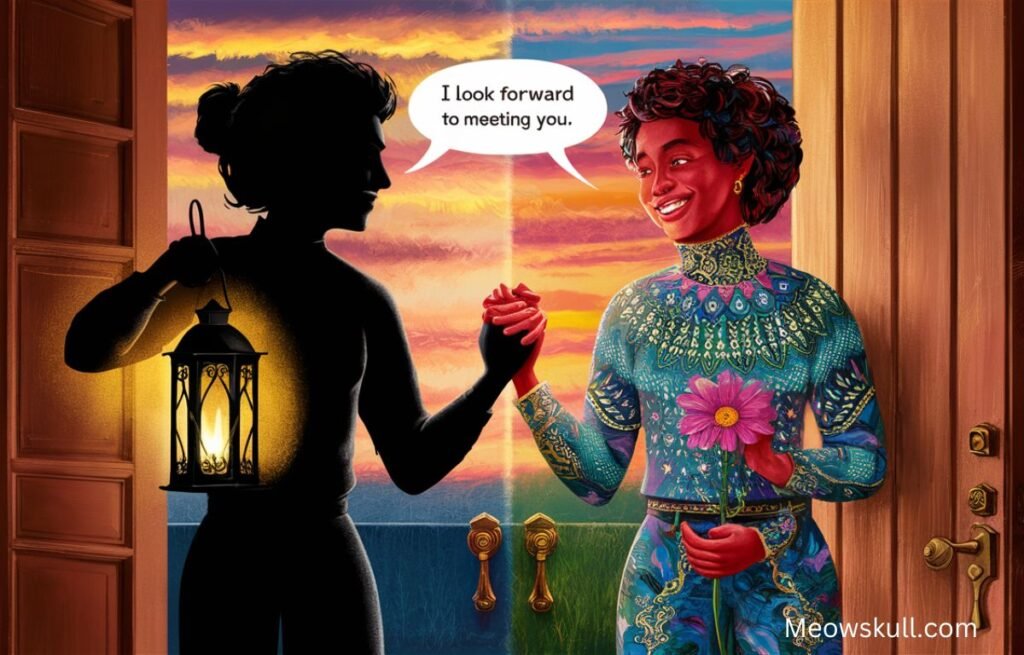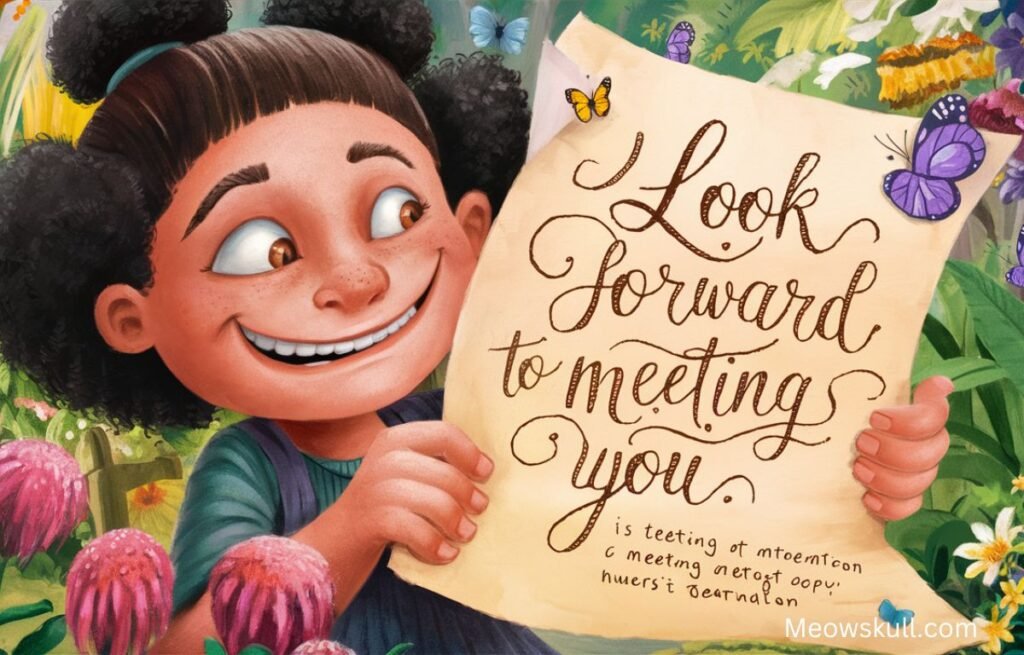In both professional and personal settings, the phrase “I look forward to meeting you” carries significant weight. It’s a common expression, yet its impact can be profound when used effectively. Whether you’re preparing for a job interview, a business meeting, or a first date, understanding how to express anticipation in a sincere and engaging way can help you make a strong first impression.
This article will explore the nuances of this phrase, offering tips and insights to ensure that your message leaves a positive and lasting impact.
Why “I Look Forward to Meeting You” Matters
The way we communicate our excitement or interest in meeting someone can set the tone for future interactions. “I look forward to meeting you” is more than just a polite formality; it’s an opportunity to express enthusiasm and establish a connection even before the meeting takes place.
When you say, “I look forward to meeting you,” you’re conveying respect, interest, and a positive outlook. This can help put the other person at ease, build rapport, and set the stage for a successful interaction.
Different Contexts for “I Look Forward to Meeting You”

The phrase can be used in a variety of contexts, each requiring a slightly different approach:
Professional Meetings
In a professional setting, saying “I look forward to meeting you” shows that you are prepared, engaged, and excited about the upcoming interaction. It signals professionalism and respect, qualities that are crucial in any business relationship.
Example: “Thank you for scheduling this meeting. I look forward to meeting you and discussing how we can work together.”
Job Interviews
During the job application process, expressing anticipation for an interview with “I look forward to meeting you” can demonstrate your eagerness for the role and your positive attitude. It can also convey confidence in your ability to contribute meaningfully to the company.
Example: “I’m thrilled to have the opportunity to interview with your team. I look forward to meeting you and learning more about the position.”
Networking Events
Networking can be intimidating, but using phrases like “I look forward to meeting you” can help ease the tension. It shows that you are open to new connections and genuinely interested in meeting new people.
Example: “I look forward to meeting you at the conference next week. It will be great to connect and share ideas.”
Personal Encounters
In personal situations, such as meeting a friend of a friend or a blind date, “I look forward to meeting you” can express a friendly, approachable attitude. It sets a positive tone and can help break the ice.
Example: “I’ve heard so much about you from Sarah. I look forward to meeting you in person!”
Also Read: The Power of Raven Team Leadership: A Quick Guide
Tips for Using “I Look Forward to Meeting You” Effectively

While the phrase itself is simple, how you use it can make a big difference. Here are some tips to ensure your message is well-received:
Be Genuine
Authenticity is key. When you say “I look forward to meeting you,” make sure you mean it. People can often sense insincerity, which can undermine the positive impact you’re trying to create.
Match the Tone to the Context
The way you express anticipation should match the formality of the situation. In a business email, you might keep the tone more professional, while in a personal context, a warmer, more casual approach might be appropriate.
Personalize Your Message
Whenever possible, personalize your message to show that you’ve put thought into your communication. Mention specific details about the meeting or the person you’re going to meet, as this can make your message more engaging.
Example: “I’m excited to learn more about your experience in digital marketing. I look forward to meeting you and discussing potential collaborations.”
Use the Right Medium
Consider how you’re delivering the message. In written communication, such as emails or text messages, the phrase “I look forward to meeting you” can stand out more if it’s placed at the end of the message, serving as a positive note to close on.
Follow Up
If the meeting is delayed or postponed, don’t hesitate to reiterate your anticipation. A quick follow-up message can reinforce your interest and keep the connection warm.
Example: “I understand the need to reschedule. I still look forward to meeting you at your earliest convenience.”
Alternatives to “I Look Forward to Meeting You”
While “I look forward to meeting you” is a tried-and-true phrase, there are alternative ways to express the same sentiment. Here are a few options:
- “I’m excited to meet you.”
- “I’m eager to meet you.”
- “I can’t wait to meet you.”
- “It will be a pleasure to meet you.”
- “I’m looking forward to our meeting.”
These alternatives can help you vary your language, especially if you’re writing multiple emails or messages around the same time.
The Impact of Positive Communication

Using phrases like “I look forward to meeting you” contributes to positive communication, which is essential in building relationships. Positive language can create an atmosphere of trust and respect, making interactions smoother and more productive.
When you express genuine interest and enthusiasm in meeting someone, it can lead to more open and engaging conversations. This can be particularly beneficial in situations where first impressions are crucial, such as interviews, first dates, or initial business meetings.
Common Mistakes to Avoid
While the phrase is straightforward, there are a few common mistakes to be aware of:
Overusing the Phrase
While it’s a positive expression, using it too frequently can make it lose its impact. Try to mix up your language with some of the alternatives mentioned earlier.
Using It in the Wrong Context
Not every situation calls for “I look forward to meeting you.” For example, in cases where the meeting is a formality or a conflict resolution session, a more neutral tone might be more appropriate.
Being Inauthentic
Avoid using this phrase if you don’t genuinely feel anticipation for the meeting. Forced enthusiasm can be easily detected and might leave a negative impression.
Also Read: Meowskulls Explosive Return meowskull.com
Conclusion: Making the Most of “I Look Forward to Meeting You”
Incorporating “I look forward to meeting you” into your communication can help set a positive tone and build rapport before you even meet someone. Whether in a professional or personal context, this simple phrase can convey enthusiasm, respect, and a genuine interest in the upcoming interaction.
Remember to be authentic, tailor your message to the context, and use the phrase in moderation. By doing so, you can ensure that your communication is not only polite but also impactful, leaving a lasting impression on the people you meet.
FAQs
What does “I look forward to meeting you” mean?
“I look forward to meeting you” is a polite and positive expression used to convey anticipation and excitement about an upcoming meeting. It indicates that the speaker is eager and prepared to meet the other person, whether in a professional or personal setting.
Is “I look forward to meeting you” formal?
Yes, “I look forward to meeting you” is generally considered a formal expression. It is commonly used in professional emails, business settings, and situations where a respectful tone is required. However, it can also be used in more casual contexts, depending on the relationship between the individuals.
Can I say “I look forward to meeting you” in an email?
Absolutely. “I look forward to meeting you” is a common phrase used in email communication, especially when confirming appointments, interviews, or networking events. It helps to set a positive tone for the upcoming interaction.
Are there any alternatives to saying “I look forward to meeting you”?
Yes, there are several alternatives you can use depending on the tone and context. Some options include “I’m excited to meet you,” “I can’t wait to meet you,” and “It will be a pleasure to meet you.” These alternatives allow you to vary your language while conveying the same sentiment.
Is it appropriate to say “I look forward to meeting you” after rescheduling?
Yes, it is appropriate to reiterate “I look forward to meeting you” after rescheduling a meeting. This shows that you are still interested and enthusiastic about the interaction, despite the change in plans. A follow-up message with this phrase can help maintain a positive connection.
How do I make “I look forward to meeting you” more personal?
To make “I look forward to meeting you” more personal, try to include specific details related to the upcoming meeting or the person you’re addressing. For example, “I look forward to meeting you and discussing your ideas on the project” adds a personal touch and shows that you’re engaged with the specifics of the meeting.
Is it possible to overuse the phrase “I look forward to meeting you”?
Yes, overusing the phrase “I look forward to meeting you” can reduce its impact. If used too frequently, it may start to sound repetitive or insincere. To avoid this, try using some of the alternative expressions or vary your language depending on the context.
When should I avoid using “I look forward to meeting you”?
You should avoid using “I look forward to meeting you” in contexts where it might not be appropriate, such as in situations where the meeting is more formal, routine, or involves conflict resolution. In such cases, a more neutral tone might be better suited.
Can I use “I look forward to meeting you” in personal relationships?
Yes, “I look forward to meeting you” can be used in personal relationships, especially when meeting someone for the first time or when you’ve been introduced by a mutual friend. It conveys a friendly and open attitude, which can help set a positive tone for the interaction.
How does using “I look forward to meeting you” affect first impressions?
Using “I look forward to meeting you” positively affects first impressions by conveying enthusiasm, respect, and a genuine interest in the upcoming meeting. It sets a welcoming tone and helps establish a connection even before the meeting occurs, which can lead to a more engaging and successful interaction.

As a seasoned contributor to “Meowskull”, Rosalie combines her linguistic prowess with a keen understanding of various topics, ensuring a delightful and informative reading experience. Her articles effortlessly blend clarity, creativity, and a touch of elegance, making language exploration an exciting journey for readers.